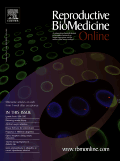
REPRODUCTIVE BIOMEDICINE ONLINE
Scope & Guideline
Innovating solutions for contemporary reproductive challenges.
Introduction
Aims and Scopes
- Assisted Reproductive Technologies (ART):
The journal publishes studies on various ART techniques, including IVF, ICSI, and PGT, emphasizing innovative approaches and their clinical outcomes. - Reproductive Endocrinology and Physiology:
Research on hormonal influences, ovarian function, and the physiological mechanisms underlying reproduction, including the impact of various pathologies such as PCOS and endometriosis. - Genetics and Epigenetics in Reproduction:
Exploration of genetic testing, including PGT and the implications of genetic conditions on fertility, embryo development, and reproductive outcomes. - Patient-Centered Fertility Care:
Studies focusing on the psychosocial aspects of infertility, patient experiences, and the integration of supportive care in reproductive medicine. - Health and Environmental Impacts on Reproduction:
Research examining the effects of lifestyle factors, environmental exposures, and health conditions on reproductive health and ART outcomes. - Innovative Technologies in Reproductive Medicine:
Advancements in technology relevant to reproductive health, including AI applications in embryo selection and laboratory practices.
Trending and Emerging
- Impact of Lifestyle and Environment on Fertility:
There is a growing body of research exploring how lifestyle choices, environmental factors, and dietary habits influence reproductive health and ART outcomes. - Artificial Intelligence and Machine Learning in Reproductive Medicine:
The integration of AI and machine learning technologies for embryo selection and prediction models is gaining momentum, marking a significant trend towards data-driven decision-making in ART. - Psychosocial Aspects of Infertility:
Research focusing on the emotional and psychological impacts of infertility and treatment on patients is increasingly recognized as crucial for holistic care. - Endometriosis and Its Systemic Effects:
Emerging studies illustrate the complex relationship between endometriosis and infertility, emphasizing the need for comprehensive approaches to diagnosis and treatment. - Genomic and Epigenomic Research in Reproductive Health:
There is an upward trend in studies investigating the genetic and epigenetic factors affecting fertility, embryo quality, and pregnancy outcomes, reflecting the importance of precision medicine. - Telemedicine Applications in Fertility Care:
The rise of telemedicine, especially following the COVID-19 pandemic, has led to increased research on its effectiveness and patient satisfaction in reproductive health services.
Declining or Waning
- Historical Fertility Treatments:
Research focusing on older methods of fertility treatment, such as traditional ovulation induction protocols, has become less prevalent as more advanced and personalized approaches gain traction. - Basic Laboratory Techniques:
Publications centered on basic laboratory techniques and methodologies may be declining as the field shifts towards more innovative and technology-driven practices. - Single-embryo Transfer Debates:
The extensive debates surrounding single-embryo transfer versus multiple transfers are becoming less frequent as consensus and guidelines solidify around practices favoring single transfers. - Ethical Considerations in ART:
While still important, the frequency of publications specifically addressing ethical debates around ART practices may be declining as regulatory frameworks evolve and become more standardized. - Surgical Interventions for Infertility:
Research focusing on surgical approaches to infertility is waning as non-invasive and less invasive techniques gain preference in clinical settings.
Similar Journals

THERIOGENOLOGY
Pioneering knowledge in veterinary reproduction since 1974.THERIOGENOLOGY is a prestigious academic journal published by Elsevier Science Inc, dedicated to the field of veterinary reproduction and animal science. With an impressive impact factor and recognized as a Q1 journal in various categories including Animal Science and Zoology, Equine, Food Animals, and Small Animals, THERIOGENOLOGY has established itself as a vital resource for researchers, practitioners, and students alike. Founded in 1974, the journal covers a broad spectrum of topics related to reproductive physiology, biotechnology, and the health management of food and companion animals. Although it does not currently offer open access, researchers can benefit from its comprehensive articles and reviews that push the boundaries of knowledge in veterinary science. With a significant placement in the Scopus rankings, ranking #1 in multiple veterinary categories, THERIOGENOLOGY serves as an essential platform for advancing the understanding of reproductive strategies and practices, thereby contributing directly to the fields of animal husbandry and veterinary medicine.

Gynecologie Obstetrique Fertilite & Senologie
Pioneering advancements in gynecological sciences.Gynecologie Obstetrique Fertilite & Senologie, published by ELSEVIER FRANCE-EDITIONS SCIENTIFIQUES MEDICALES ELSEVIER, serves as a crucial resource for researchers and practitioners in the fields of obstetrics, gynecology, and reproductive medicine. Established in 2017 and continuing through 2024, this journal provides a platform for the dissemination of impactful research, evidenced by its placement in the Q3 category for both obstetrics and gynecology and reproductive medicine in 2023. Although it currently does not operate under an open-access model, the journal is committed to advancing knowledge and practice in women's health and reproductive issues, ensuring that professionals stay at the forefront of scientific developments. With an ISSN of 2468-7197 and an E-ISSN of 2468-7189, the journal not only supports the global medical community from its base in France but also contributes to the broader academic discourse on critical topics such as fertility and women's health. As researchers and professionals in the field seek to enhance their understanding and impact, Gynecologie Obstetrique Fertilite & Senologie remains an essential publication for quality research and innovative solutions in women’s health.
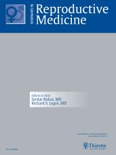
SEMINARS IN REPRODUCTIVE MEDICINE
Fostering Collaboration in Reproductive ResearchSEMINARS IN REPRODUCTIVE MEDICINE is a leading peer-reviewed journal dedicated to exploring the complexities of human reproduction, offering insightful perspectives that encompass advances in reproductive endocrinology, obstetrics, and gynecology. Published by THIEME MEDICAL PUBL INC, this esteemed journal holds a notable spot in multiple Scopus categories, ranking 21st in Reproductive Medicine and 38th in Obstetrics and Gynecology, with an impressive impact in the Q1 and Q2 quartiles. With its commitment to high-quality research and clinical implications, the journal serves as a vital resource for practitioners, researchers, and students alike, fostering an environment of innovation and collaboration in the rapidly evolving reproductive health landscape. SEMINARS IN REPRODUCTIVE MEDICINE also offers convenient open access options, ensuring that its contributions are readily available to the global academic community. For over two decades, from its establishment in 1999 to the present, it has retained a pivotal role in disseminating critical findings that inform both clinical practice and future research efforts.
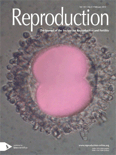
REPRODUCTION
Exploring the frontiers of reproductive science.REPRODUCTION, published by BIOSCIENTIFICA LTD, stands at the forefront of research in the fields of reproductive and developmental biology. With a focus on advancing our understanding of reproductive health and mechanisms, the journal has garnered an impressive reputation, consistently ranking in the first quartile for key categories including Embryology, Endocrinology, Obstetrics and Gynecology, and Reproductive Medicine in 2023. Notably, it holds an esteemed position in the Scopus rankings, with high percentiles that reflect its significant impact in the scientific community. The journal is committed to open access, promoting the broad dissemination of high-quality research to facilitate innovative discoveries and interdisciplinary collaboration. Situated in the United Kingdom, REPRODUCTION serves as a vital resource for researchers, professionals, and students eager to contribute to the evolving landscape of reproductive sciences and related fields.
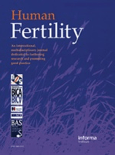
Human Fertility
Transforming Obstetrics and Gynecology through EvidenceHuman Fertility, published by Taylor & Francis Ltd, is a key academic journal that serves the dynamic fields of medicine, obstetrics and gynecology, and reproductive medicine. Established in 1998 and with converged content extending to 2024, the journal holds a notable Q2 ranking in its respective categories, highlighting its influence and scholarly contributions to current research and practice. With an ISSN of 1464-7273 and an E-ISSN of 1742-8149, it rigorously disseminates studies, reviews, and advancements in human fertility, particularly emphasizing evidence-based practices and innovative techniques. Despite its traditional subscription model, the journal remains vital for researchers, healthcare professionals, and students seeking to foster advancements in reproductive health. Its articles are pivotal in addressing the multifaceted challenges faced in reproductive health and guiding future research trajectories.

Reproductive and Developmental Medicine
Transforming knowledge into practice in reproductive health.Reproductive and Developmental Medicine is a pioneering open-access journal dedicated to advancing knowledge in the fields of reproductive medicine and developmental biology. Published by LIPPINCOTT WILLIAMS & WILKINS, the journal serves as a platform for researchers, clinicians, and graduate students alike, fostering collaboration and dissemination of innovative research findings. With an ISSN of 2096-2924 and E-ISSN 2589-8728, it has established a significant presence in the academic community since its inception in 2017. The journal is indexed in Scopus and achieved a category quartile ranking of Q3 in Obstetrics and Gynecology and Q4 in Reproductive Medicine as of 2023, highlighting its importance as a resource for cutting-edge studies and reviews in these vital areas. The journal's open-access model ensures that research is readily available to scholars and practitioners worldwide, thus enhancing the global discourse in reproductive health and development. This makes Reproductive and Developmental Medicine an invaluable resource for those dedicated to improving outcomes in obstetrics, gynecology, and reproductive health.
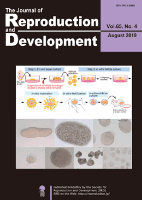
JOURNAL OF REPRODUCTION AND DEVELOPMENT
Exploring the intricate pathways of life.JOURNAL OF REPRODUCTION AND DEVELOPMENT, published by the SOCIETY REPRODUCTION & DEVELOPMENT-SRD in Japan, is a leading peer-reviewed journal dedicated to advancing the field of reproduction and development in animal sciences. With a notable impact factor reflected in its prestigious Q1 Quartile ranking in Animal Science and Zoology, the journal aims to disseminate cutting-edge research that explores the complexities of reproductive biology, developmental processes, and their implications for agriculture and biodiversity. This journal invites contributions that span multidisciplinary interests, thereby facilitating the integration of scientific knowledge and practical applications. Researchers, professionals, and students can benefit from the insights shared within its pages, as it strives to foster collaboration and innovation in the field. The journal’s comprehensive scope and esteemed reputation, underscored by its Scopus rank of #115 out of 490 in the category, make it an invaluable resource for anyone invested in the study of reproduction and development.

Reproduction and Fertility
Connecting knowledge with clinical practice.Reproduction and Fertility is a premier academic journal published by BIOSCIENTIFICA LTD, dedicated to advancing knowledge in the fields of reproductive sciences, obstetrics, gynecology, and related areas. Established with a focus on delivering high-quality research, this journal has quickly ascended in prominence, achieving a commendable Q2 ranking in multiple categories, including Embryology, Obstetrics and Gynecology, Reproductive Medicine, and Urology, as of 2023. With an E-ISSN of 2633-8386, Reproduction and Fertility aims to provide a valuable platform for researchers, professionals, and students alike, offering insights into the latest discoveries and innovations in reproductive health. Although currently not an open-access journal, it remains committed to disseminating important findings that can influence clinical practices and policy-making worldwide. Operating from its headquarters in Bristol, United Kingdom, the journal serves as an essential resource for anyone invested in understanding and improving reproductive health outcomes through rigorous academic research.

Reproductive Medicine and Biology
Exploring breakthroughs in reproductive science.Reproductive Medicine and Biology, an esteemed journal published by WILEY, stands at the forefront of advancements in the field of reproductive health and associated biological sciences. With an impact factor that underscores its relevance—ranking in Q1 for Reproductive Medicine and Q3 in Cell Biology—this journal is distinguished by its commitment to disseminating high-quality, peer-reviewed research since its transition to Open Access in 2002. Based in Japan, the journal caters to a global audience, providing vital insights into reproductive biology, therapeutics, and innovative practices. With Scopus rankings placing it at #22 out of 90 in Reproductive Medicine and a commendable percentile ranking, Reproductive Medicine and Biology aims to foster dialogue and knowledge transfer among researchers, professionals, and students, paving the way for breakthroughs in understanding reproductive health.

Jornal Brasileiro de Reproducao Assistida
Innovating the future of assisted reproduction.Jornal Brasileiro de Reprodução Assistida is a prominent academic journal focusing on the latest advancements in reproductive medicine, published by the Sociedade Brasileira de Reprodução Assistida (SBRA). With an ISSN of 1517-5693 and an E-ISSN of 1518-0557, this journal has established itself as a vital resource for researchers, healthcare professionals, and students in the fields of obstetrics and gynecology. Notably recognized within the Q2 category for Obstetrics and Gynecology, it ranks #91 out of 209 in Scopus, placing it in the 56th percentile among its peers. The journal serves as a platform for disseminating innovative research and clinical practices related to assisted reproduction, fostering collaboration and knowledge sharing among professionals in Brazil and beyond. Although currently not an open-access journal, it remains committed to enhancing the scientific discourse in reproductive health, reflecting its vision of supporting advances in healthcare through rigorous peer-reviewed studies. Explore the pivotal contributions made in this field from 2000 to the present, and stay abreast of transformative developments that are shaping reproductive science.